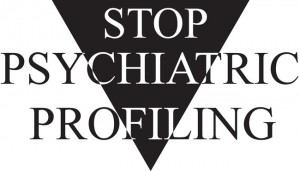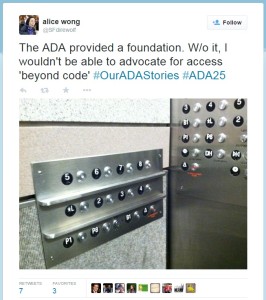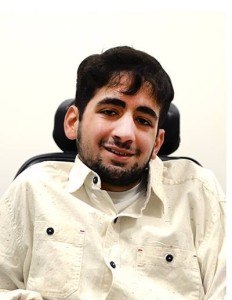This year, marking the 25th anniversary of the passage of the Americans with Disabilities Act (ADA), gives us much to celebrate. While the ADA has strengthened civil rights protections and increased accessibility to some public transit and public accommodations (among other things) it is far from perfect. The provisions relating to employment haven’t greatly increased the number of people with disabilities anywhere near as much as we would have hoped. Those of us who need access to print and/or electronic materials can tell you that said provisions are often disregarded and unnecessarily difficult to remedy or enforce.
In addition, there are other groups within the disability community whose civil rights either weren’t included in the original law and/or have been weakened by subsequent regulations, interpretations and court decisions. While the amendments to the ADA (passed as the ADA Amendments Act in 2008) brought some clarification and relief, they simply couldn’t be expected to fix all concerns. For example, parental and other civil rights issues concerning people with mental health disabilities are largely unaddressed by the ADA and its subsequent amendments.
One of the things that the ADA accomplished was to bring the disability community together as had not happened previously. One of the reasons why this happened was that the disability community put people with disabilities first. To a great extent, however, this hasn’t happened specifically for people with mental health disabilities. Too often, fear and discrimination prevail even though mental health disabilities are the most common type of disability – half of Americans can expect a diagnosis during their lifetime. And, people with disabilities, including those diagnosed with mental health disabilities, are more likely to become victims than perpetrators of violence.
 On 4 June, Representative Murphy introduced H.R. 2646 “To Make Available Needed Psychiatric, Psychological, and Supportive Services for Individuals with Mental Illness and Families in Mental Health Crisis, and for Other Purposes” (this was listed as the official title of the bill as introduced). As of this writing, the bill text has yet to be made available by the Government Printing Office. We understand, however, that this bill contains many of the provisions that threatened civil rights contained in the bill Representative Murphy introduced in the previous Congress, which did not pass. Provisions in the previous and current bills threaten privacy rights and increase the use of forced treatment in the community, among other concerns. NCIL opposes any legislation or administrative action that continues or strengthens denial of rights based solely on a diagnosis or disability and any deprivation of liberty based on disability rather than criminal activity. We will, of course, provide updates on the bill as it moves through Congress and are already working vigorously to oppose this bill.
On 4 June, Representative Murphy introduced H.R. 2646 “To Make Available Needed Psychiatric, Psychological, and Supportive Services for Individuals with Mental Illness and Families in Mental Health Crisis, and for Other Purposes” (this was listed as the official title of the bill as introduced). As of this writing, the bill text has yet to be made available by the Government Printing Office. We understand, however, that this bill contains many of the provisions that threatened civil rights contained in the bill Representative Murphy introduced in the previous Congress, which did not pass. Provisions in the previous and current bills threaten privacy rights and increase the use of forced treatment in the community, among other concerns. NCIL opposes any legislation or administrative action that continues or strengthens denial of rights based solely on a diagnosis or disability and any deprivation of liberty based on disability rather than criminal activity. We will, of course, provide updates on the bill as it moves through Congress and are already working vigorously to oppose this bill.
NCIL’s Mental Health Civil Rights Subcommittee meets monthly via teleconference and also maintains an active page on Facebook. Please contact us through NCIL’s website or via Facebook if you are interested in helping with our work.
 The Disability Visibility Project invites people of all ages to submit a photo or message from now to July 26th. Some things to consider when thinking about your ADA story:
The Disability Visibility Project invites people of all ages to submit a photo or message from now to July 26th. Some things to consider when thinking about your ADA story: This isn’t your typical article on financial abuse and exploitation. You will not find tips on preventing this crime or a discussion on the latest schemes. Instead the focus is why – why this crime continues, why it is not prosecuted more, and why it continues to flourish especially with seniors. Do I solve these “whys” in this article? No. After 42 years in business taking care of other people’s money, I continue to search for answers.
This isn’t your typical article on financial abuse and exploitation. You will not find tips on preventing this crime or a discussion on the latest schemes. Instead the focus is why – why this crime continues, why it is not prosecuted more, and why it continues to flourish especially with seniors. Do I solve these “whys” in this article? No. After 42 years in business taking care of other people’s money, I continue to search for answers. On the 100 day countdown to the 25th Anniversary of the Americans with Disabilities Act, the ADA Legacy Project is pleased to announce the release of a universally designed Public Service Announcement marking the 25th Anniversary of the ADA. This PSA highlights several events leading up to and including the signing of the ADA by President George H. W. Bush on July 26, 1990. Included in the PSA is a commemorative logo designed by Dan Wilkins, as well as historic black and white photographs provided by Tom Olin including a march, the Capitol crawl, and other demonstrations by persons with disabilities and their supporters.
On the 100 day countdown to the 25th Anniversary of the Americans with Disabilities Act, the ADA Legacy Project is pleased to announce the release of a universally designed Public Service Announcement marking the 25th Anniversary of the ADA. This PSA highlights several events leading up to and including the signing of the ADA by President George H. W. Bush on July 26, 1990. Included in the PSA is a commemorative logo designed by Dan Wilkins, as well as historic black and white photographs provided by Tom Olin including a march, the Capitol crawl, and other demonstrations by persons with disabilities and their supporters. But now as a college student, I award myself with pints of ice cream for making it through an exam. Since overindulgent desserts weren’t reserved for anniversaries, I needed a new way to think about them. Fortunately, as an intern with NCIL, I was able to find a new meaning for anniversaries.
But now as a college student, I award myself with pints of ice cream for making it through an exam. Since overindulgent desserts weren’t reserved for anniversaries, I needed a new way to think about them. Fortunately, as an intern with NCIL, I was able to find a new meaning for anniversaries.
